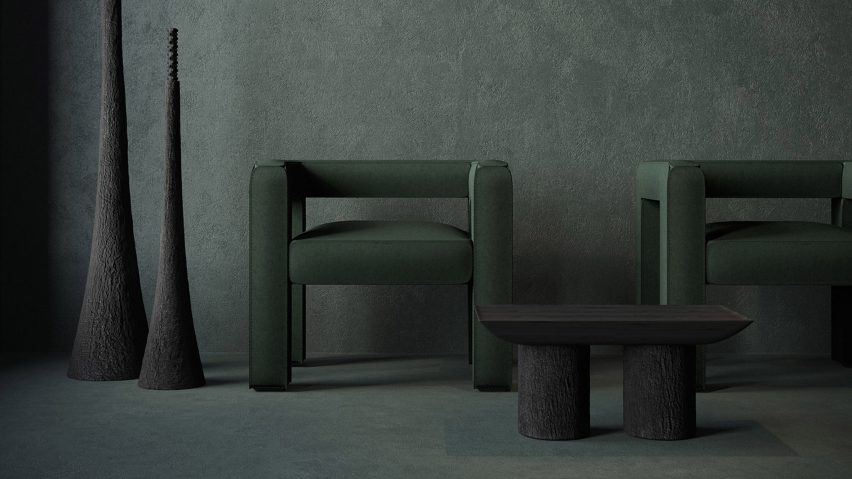Kyiv design brand Faina looked to traditional local materials for items of furniture made from clay, wood, willow and flax that tell the story of Ukraine's design roots.
Cabinets with doors crafted from clay and seats made from flax covered with a special biopolymer coating are some of the designs produced by the brand.
Set up in 2014 by architect and designer Victoriya Yakusha with the aim of putting the large eastern European country's design industry on the map, Faina incorporates local natural materials into its furniture lines.
Yakusha, who has also run Yakusha Design Studio since 2006, works out of an office in Kyiv that was recently longlisted for the small workspace interior category in this year's Dezeen Awards.
"The collections are totally based on domestic traditions, materials and craft techniques," Yakusha explained to Dezeen. "We are trying to transform traditions into contemporary minimalist design objects in a very careful and respectful way."
Both the Korotun coffee table and Veleten desk sit on two giant ceramic legs, whilst the Solod bar cabinet – meaning cereal grains in Ukrainian – has an intricate clay facade. Made up of four separate pieces, the facade sits inside a wooden frame.
The first cabinets with ceramic doors, called Pechyvo, meaning crackers, were launched in 2014.
It took Faina around eight months working with more than 10 local artisans to experiment with the material and develop doors that were durable enough to function on an item of furniture.
In order to create the clay pieces, they collected samples of original Ukrainian pottery and got in touch with the artisans who made them, who often still use ancient manual techniques.
"In their hands the seemingly fragile nature of clay turned out to be very reliable and modern-looking in the aesthetic sense," said the brand.
Clay is also believed to be beneficial for health and wellbeing in Ukraine, and is widely used in the home, for example to make benches and beds, as well as structural elements such as walls.
"It's believed in some Ukrainian villages that this material can actually heal people, filling their hearts with warmth and their bodies with living energy," Yakusha added.
As well as working with clay, Faina has produced a line of furniture that is suitable for both indoor and outdoor use. Called Ztista, which means 'made of dough', it comprises a chair, bar stool, bench, and table.
Each item is formed by covering a metal frame with flax, that is sculpted by hand to produce organic shapes. This is overlaid with a biopolymer coating for a durable, waterproof surface.
The process is similar to an ancient modelling technique employed in building traditional mud huts that deliberately leaves the fingerprints of its maker on the surface.
"We decided to experiment with local materials that were never used for furniture before, such as flax, and create objects that would reflect the beauty of imperfection, like sculptures made by an artist," the brand explained.
Other items in Faina's collections include lighting made from willow, such as the Strikha pendant lamp that is 1.6 metres wide. They worked with a carpet weaving master to create the giant lamp, which resembles the straw roof of a traditional Ukrainian hut.
The brand has also used instruments from the national folk music tradition as a jumping-off point for pieces of homeware.
A wind instrument called the trembita inspired a set of decorative floor vases made out if a single burnt tree with an ornate ceramic top. The trembita is a long, wooden horn common among the Hutsuls, an ethnic group from the mountains of western Ukraine.
The Bandura – a folk string instrument with a tear-shaped body – can be seen in vases of the same name, whilst Buhay has a ceramic base and a wooden top complete with a horsehair tail extruding from its lid.
It is based on a drum that consists of a conical barrel with a sheep's stomach stretched over its surface and a tuft of horse hair passed through a central hole.
The drum was invented by, and has been popular with, the Cossacks – Slavic-speaking people spread across eastern Ukraine and southern Russia – for more than 400 years.
"The storytelling about contemporary living, investigated through the theme of our cultural roots is very near to my heart," said Yakusha.
"Contemporary design feeds with cultural roots, restores natural harmony between our ancestors and future generations and prevents us from losing our identity. We should never forget where we come from and be proud of who we have become."
Ukrainian architecture practice Balbek Bureau completed offices in the capital for the software company Grammarly, which was founded in Kyiv. The office is set over two floors and features nap pods and a soundproof music room.

